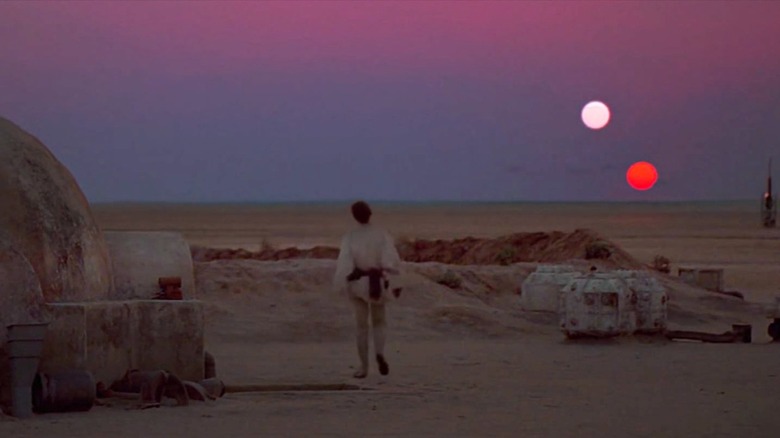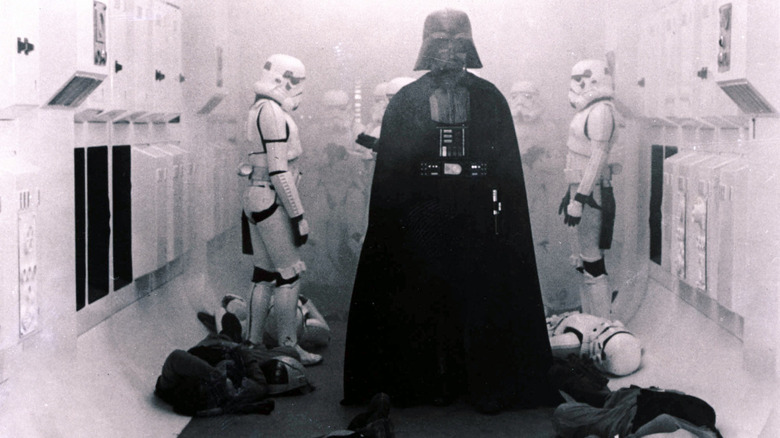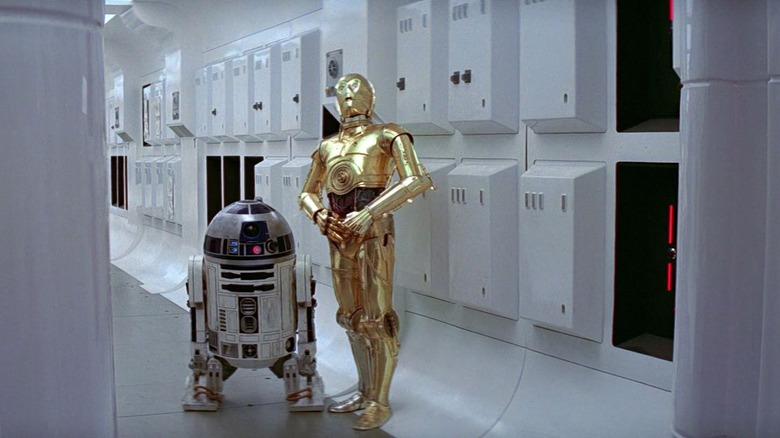The Biggest Challenge For The Future Of Star Wars, According To Lucasfilm's Executive Vice President
"Star Wars," as an ever-humming business franchise, has always found itself in an odd position, creatively. The 1977 film, inspired by director George Lucas' fondness for the low-budget cinema serials of his youth, took place in a universe that hinted at gigantic possibilities. Luke Skywalker (Mark Hamill) and Obi-Wan Kenobi (Alec Guinness) took a trip to the local bar to find a rogue's gallery of unusual aliens and creatures, all engaged in bizarre, ineffable acts of varying vices. Lines of dialogue alluded to a larger, more interesting universe than Luke inhabited. Talk of magical wizards called Jedi and extinct evil mages inflamed the imagination. There's not enough time to explore all of this stuff, the movie seemed to say, but — wow! — what wonders to contemplate.
In a weird way, the overwhelming success of "Star Wars" undid it creatively. Now that they were well-known by people who had seen the film multiple times, characters and events from "Star Wars" practically had to be revisited more closely; there was no way that the franchise would abandon Darth Vader as antagonist or Luke as its hero. Indeed, the universe revealed itself to be specifically constructed around Luke Skywalker. He wasn't some random hayseed from a nowhere planet, but — as stated in 1980's "The Empire Strikes Back" — the long-lost son of the newly-returned Darth Vader (David Prowse, voiced by James Earl Jones), now mysteriously promoted to second-in-command of the entire Empire.
Later, in the '90s and '00s, Lucas would make an entire trilogy of films puffing up the importance of Darth Vader — not because the character was important in the 1977 film (he was previously ranked under Grand Moff Tarkin), but because he was important to fans.
The circling of the familiar
"Star Wars" has continued with that model apace ever since, using its new films to repeat familiar plot points and attaching entire movies and TV shows to single lines of dialogue from the '70s or '80s that were initially incidental, but had become gospel to the film's many obsessives. Decades after the events of "Star Wars" and 42 years after the release of the original film, "The Rise of Skywalker" was still giving real estate to Emperor Palpatine (Ian McDiarmid), Leia (Carrie Fisher), and Han Solo (Harrison Ford), even after he had died. As over 40 years of the franchise have revealed, "Star Wars" repeats itself and delves into known details far more often than it makes good on its promise to expand the universe into new worlds, new concepts, and new aliens. Catching up with Obi-Wan between movies is more important that catching up with the "Star Wars" universe millennia into its future. Or millennia into its past.
A recent /Film interview with Lucasfilm executive vice president Lynwen Brennan revealed that the people running the franchise have found this notion to present a unique challenge. Limited to the specific 67-year timeframe of events in "Star Wars" ("Phantom Menace" through "Rise of Skywalker"), Brennan admits that exploration is secondary to careful interior gazing. When asked about the biggest challenge currently facing the franchise, she replied it was a question the Lucasfilm creative team asks themselves all the time. She continued:
"I think the wonderful thing about 'Star Wars' is it's a gigantic galaxy with thousands and thousands of years of history, so that's a big place to explore. Finding a way that we can explore those different parts, but in a way that's connected and doesn't feel overwhelming, and we don't overdo it — because I think 'Star Wars' is also special."
Telling stories
That connection Brennan mentioned seemingly implies that it would be antithetical to "Star Wars" to tell a story that is beyond known context. Every story, she seems to argue, must be directly connected to a previous story, otherwise it would be violating the spirit of the thing.
Brennan does feel, however, that there is a very humble impulse behind "Star Wars," and that's the storytelling itself:
"[W]e always want to make sure that when we're telling a story, it's the type of story that needs to be told or that people want to hear about. I think that's the most important thing: When we're telling stories, they have some context and they have a reason for being. Because there's a lot we could do, but I don't think you want to do everything you could do all at the same time. You have to parse it out."
The most dramatic time-shifts in "Star Wars" have been between "Return of the Jedi" (1983) and "The Phantom Menace" (1999), which flashed the story back to Darth Vader's childhood, and then between "Revenge of the Sith" (2005) and "The Force Awakens" (2015) which zipped forward to the next generation. Completely straying from what is now being called colloquially The Skywalker Saga is not something "Star Wars" is well-equipped to do, and Brennan admits that being too dramatic with the fabric of "Star Wars" will rob the series of a vital sense of interconnectivity.
So, sadly, don't expact to see any 10,000-year-into-the-future time jumps (like in Frank Herbert's "Dune" sequels) in the "Star Wars" franchise ... at least not for the time being.


